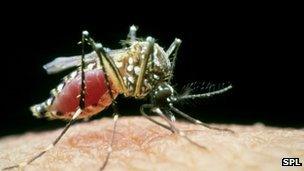Sudan's yellow fever outbreak 'worst for 20 years'
- Published

Experts say the outbreak of yellow fever gripping Sudan is the worst the world has seen in at least 20 years.
More than 800 suspected cases of the mosquito-spread disease have been reported across the Darfur region since the outbreak began in October.
The virus, which can cause jaundice and kidney failure, has killed 168 people.
The World Health Organization's Anshu Banerjee said few people in Sudan were immune to it and an emergency mass vaccination campaign was now under way.
The first phase of the immunisation programme began on 21 November, to cover 2.2 million people, and the second phase is planned for this month, to cover an additional 1.2 million people at risk.
Dr Banerjee said another 2.2m doses of the vaccine were expected to arrive soon.
"This should be enough to protect the population in Darfur that is at risk and stop it spreading to the rest of Sudan," he said.
He said some other African countries, like Cameroon, had also reported some cases of yellow fever recently, but unlike Sudan, many of these already include the yellow fever vaccine in their childhood immunisation programmes.
"There's been no such vaccine campaign in Sudan for decades. It's because of priorities. Sudan recently identified itself as a high-risk country for a yellow fever outbreak and had conditional approval to begin a vaccination campaign.
"Unfortunately the outbreak hit before this could happen.
"This is the worst outbreak we have seen globally in 20 years or more."
British International Development Secretary Justine Greening said the UK government had contributed £1.8m ($2,9m) towards the vaccination campaign to stop it becoming a "nationwide epidemic".
In Darfur, the disease has spread following nomadic migration routes across the region.
At the moment, yellow fever is mostly restricted to rural areas. However, there is a risk that it will spread to urban areas including the camps that house up to two million people who fled their homes because of the Darfur conflict.
Yellow fever is endemic in tropical regions of Africa and South America.
A vaccine can prevent infection but there is no specific drug treatment for people who are infected.
In its most severe form it causes bleeding, jaundice and possible liver and kidney failure.
- Published15 March 2012
- Published8 March 2012